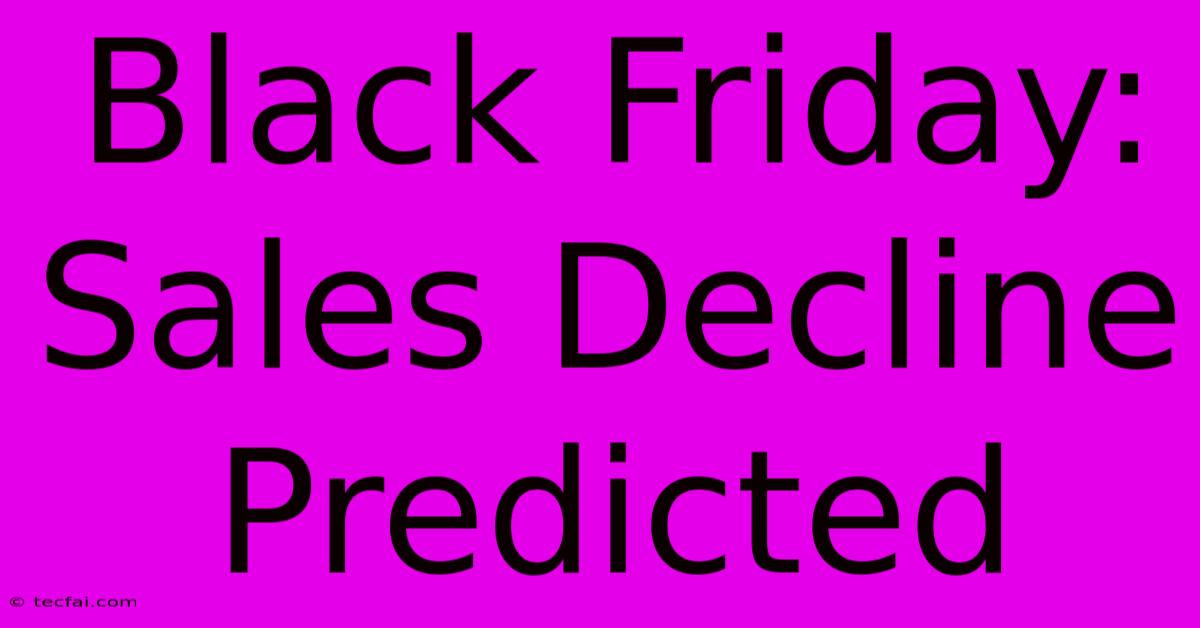Black Friday: Sales Decline Predicted

Discover more detailed and exciting information on our website. Click the link below to start your adventure: Visit Best Website tecfai.com. Don't miss out!
Table of Contents
Black Friday: Sales Decline Predicted Amidst Shifting Consumer Habits
Black Friday, traditionally the undisputed champion of retail's holiday shopping season kickoff, is facing headwinds. Predictions for 2024 point towards a potential sales decline, a shift that reflects evolving consumer behavior and a more cautious economic climate. While the day remains a significant shopping event, understanding the factors contributing to this projected downturn is crucial for both retailers and consumers.
The Economic Headwinds: Inflation and Recessionary Fears
One of the most significant factors influencing the predicted sales decline is the persistent impact of inflation. Rising prices across various goods and services have squeezed household budgets, leaving consumers with less disposable income to spend on non-essential items. Coupled with lingering concerns about a potential recession, many shoppers are adopting a more conservative approach to their spending habits. This cautiousness translates directly into reduced spending on Black Friday deals, even with the allure of significant discounts.
The Shift in Consumer Behavior: Online Shopping and Early Bird Deals
The traditional frenzy of Black Friday in-store shopping is also facing a significant challenge from the continued growth of online shopping. Consumers are increasingly comfortable purchasing goods online, benefiting from the convenience of browsing and comparing prices from the comfort of their homes. Furthermore, the rise of early Black Friday deals and extended sales periods throughout November means the concentrated rush on the Friday itself is being diffused. Retailers are extending their promotional periods, attempting to spread the sales and manage the logistical challenges associated with a single peak shopping day.
Retail Strategies for Navigating the Changing Landscape
Retailers are not passively accepting this projected decline. Many are adapting their strategies to counter the economic downturn and shifting consumer preferences. These strategies include:
- Emphasis on Value and Exclusivity: Offering genuine value-driven deals rather than superficial discounts is critical. Focusing on exclusive offers and limited-time promotions can generate a sense of urgency and encourage purchases.
- Enhanced Omnichannel Experience: Seamless integration of online and offline shopping experiences is becoming paramount. This includes offering convenient options like buy online, pick up in-store (BOPIS) and curbside pickup.
- Personalized Marketing: Tailored marketing campaigns that target specific customer segments with relevant offers and promotions are more effective than blanket advertising. Understanding consumer preferences and tailoring messaging accordingly is essential.
- Loyalty Programs and Rewards: Building customer loyalty through rewards programs incentivizes repeat purchases and fosters brand affinity, particularly crucial in a competitive market.
What Does This Mean for Consumers?
For consumers, the projected sales decline might translate into a less chaotic shopping experience on Black Friday itself. However, it’s crucial to remain discerning. While deals may still be available, it's vital to compare prices across different retailers and avoid impulsive purchases. Prioritizing needs over wants and creating a shopping budget are essential strategies for navigating the Black Friday sales landscape successfully.
The Future of Black Friday: Adaptation and Evolution
Black Friday, while facing challenges, is not likely to disappear. Instead, it's adapting and evolving to fit the changing consumer landscape. The future of Black Friday hinges on the ability of retailers to effectively address the economic uncertainties, adjust their strategies to meet the evolving preferences of shoppers, and create a more balanced and less frenzied shopping experience. The days of massive in-store crowds might be fading, but the spirit of finding great deals remains.

Thank you for visiting our website wich cover about Black Friday: Sales Decline Predicted. We hope the information provided has been useful to you. Feel free to contact us if you have any questions or need further assistance. See you next time and dont miss to bookmark.
Featured Posts
-
Amazon Canada Black Friday 2024 Deals
Nov 30, 2024
-
Black Friday Deals Canada 2024 Guide
Nov 30, 2024
-
Golf Australia Responds To Smith Drama
Nov 30, 2024
-
Most Ptsb Customers Payments Fixed
Nov 30, 2024
-
I M A Celeb Departure Jane Moores Comments
Nov 30, 2024
